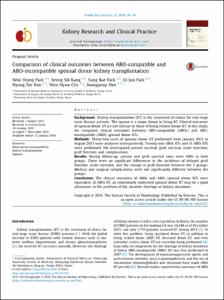KUMEL Repository
1. Journal Papers (연구논문)
1. School of Medicine (의과대학)
Dept. of Internal Medicine (내과학)
Comparison of Clinical Outcomes between ABO-Compatible and ABO-Incompatible Spousal Donor Kidney Transplantation
- Keimyung Author(s)
- Park, Woo Young; Kang, Seong Sik; Park, Sung Bae; Han, Seung Yeup; Park, Ui Jun; Kim, Hyoung Tae; Cho, Won Hyun
- Journal Title
- Kidney Research and Clinical Practice
- Issued Date
- 2016
- Volume
- 35
- Issue
- 1
- Abstract
- Background: Kidney transplantation (KT) is the treatment of choice for end-stage
renal disease patients. The spouse is a major donor in living KT. Clinical outcomes
of spousal donor KT are not inferior to those of living related donor KT. In this study,
we compared clinical outcomes between ABO-compatible (ABOc) and ABOincompatible
(ABOi) spousal donor KTs.
Methods: Thirty-two cases of spousal donor KT performed from January 2011 to
August 2013 were analyzed retrospectively. Twenty-one ABOc KTs and 11 ABOi KTs
were performed. We investigated patient survival, graft survival, acute rejection,
graft function, and complications.
Results: During follow-up, patient and graft survival rates were 100% in both
groups. There were no significant differences in the incidence of delayed graft
function, acute rejection, and the change in graft function between the 2 groups.
Medical and surgical complications were not significantly different between the
groups.
Conclusion: The clinical outcomes of ABOc and ABOi spousal donor KTs were
equivalent. In ABOi KT, an emotionally motivated spousal donor KT may be a good
alternative to the problem of the absolute shortage of kidney donations.
- Publisher
- School of Medicine
- Citation
- Woo Yeong Park et al. (2016). Comparison of Clinical Outcomes between ABO-Compatible and ABO-Incompatible Spousal Donor Kidney Transplantation. Kidney Research and Clinical Practice, 35(1), 50–54. doi: 10.1016/j.krcp.2015.11.001
- Type
- Article
- ISSN
- 2211-9132
- 파일 목록
-
-
Download
 oak-2016-0047.pdf
기타 데이터 / 471.76 kB / Adobe PDF
oak-2016-0047.pdf
기타 데이터 / 471.76 kB / Adobe PDF
-
Items in Repository are protected by copyright, with all rights reserved, unless otherwise indicated.